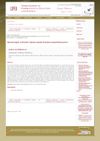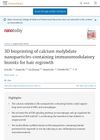 August 2023 in “Indian Journal of Pharmaceutical Education and Research”
August 2023 in “Indian Journal of Pharmaceutical Education and Research” Nanoemulgel is a promising method for applying topical drugs effectively, but safety must be evaluated due to new administration techniques.
 28 citations,
August 2015 in “Journal of Drug Targeting”
28 citations,
August 2015 in “Journal of Drug Targeting” The new CoQ10 gel protects mouse skin better against aging from UV light than the old gel.
 18 citations,
January 2016 in “Elsevier eBooks”
18 citations,
January 2016 in “Elsevier eBooks” Nanotechnology improves cosmetics' effectiveness and safety.
 21 citations,
July 2017 in “Journal of Cosmetic and Laser Therapy”
21 citations,
July 2017 in “Journal of Cosmetic and Laser Therapy” Vesicular carriers like liposomes may improve cosmetic skin treatment delivery and effectiveness but need more human research.
April 2024 in “Journal of composites science” Hydrogel composites have great potential in regenerative medicine, tissue engineering, and drug delivery.
 34 citations,
July 2010 in “Expert Opinion on Drug Delivery”
34 citations,
July 2010 in “Expert Opinion on Drug Delivery” The document concludes that there is no agreed-upon best method for measuring drug delivery within hair follicles and more research is needed to validate current techniques.
 January 2025 in “AAPS PharmSciTech”
January 2025 in “AAPS PharmSciTech” Transethosomes improve drug delivery through the skin and show promise for treating various conditions.
 15 citations,
November 2019 in “Cutaneous and Ocular Toxicology”
15 citations,
November 2019 in “Cutaneous and Ocular Toxicology” Minoxidil tretinoin liposomal based hydrogel shows promise for effective treatment of hair loss by delivering both drugs at the same time.
1 citations,
August 2022 in “BioMed Research International” Chitosan-decorated nanoparticles can improve skin delivery and reduce side effects of finasteride.
 2 citations,
August 2021 in “Journal of pharmaceutical research international”
2 citations,
August 2021 in “Journal of pharmaceutical research international” Fenugreek seed extract in a nanoparticle gel could be a promising new treatment for hair loss.

Plant-based compounds can improve wound dressings and skin medication delivery.
 1 citations,
December 2023 in “Annals of Phytomedicine An International Journal”
1 citations,
December 2023 in “Annals of Phytomedicine An International Journal” Nanoemulgel improves delivery and effectiveness of plant-based drugs for various conditions.
69 citations,
March 2016 in “American journal of clinical dermatology” Topical retinoids effectively improve photodamaged skin.
 36 citations,
September 2019 in “Journal of Herbal Medicine”
36 citations,
September 2019 in “Journal of Herbal Medicine” Herbal nano-formulations show potential for effective skin delivery but need more research.
 1 citations,
December 2023 in “Egyptian Journal of Veterinary Science”
1 citations,
December 2023 in “Egyptian Journal of Veterinary Science” Astragalus polysaccharides nanogel heals wounds better than Gold-Silver nanocomposite gel.
3 citations,
October 2022 in “Nano Letters” Machine learning identified promising nanozymes for treating hair loss.
6 citations,
November 2020 in “Chinese Medical Journal” Combining minoxidil and fibroblast growth factor is more effective for treating male hair loss than using either alone.
 August 2024 in “Cosmetics”
August 2024 in “Cosmetics” Caffeine is beneficial for skin and hair treatments but needs better delivery methods to penetrate deeper skin layers.
 2 citations,
March 2020 in “International Journal of Molecular Sciences”
2 citations,
March 2020 in “International Journal of Molecular Sciences” Topical treatments can deliver active molecules to skin stem cells, potentially helping treat skin and hair disorders, including skin cancers and hair loss.
 February 2024 in “Current Bioactive Compounds”
February 2024 in “Current Bioactive Compounds” The new gel formulation effectively delivers Finasteride for hair growth treatment without skin irritation.
4 citations,
February 2023 in “Frontiers in Oncology” Nano-Pulse Stimulation™ Therapy is more effective and less damaging than cryoablation for treating melanoma tumors in mice.
19 citations,
October 2021 in “Nano letters” Gold nanoparticles can safely and effectively treat psoriasis without drugs and have no major side effects.
 4 citations,
March 2023 in “Journal of controlled release”
4 citations,
March 2023 in “Journal of controlled release” A special gel with medicine helps prevent melanoma from coming back after surgery.
 43 citations,
February 2020 in “Clinica chimica acta”
43 citations,
February 2020 in “Clinica chimica acta” Nano-sized plant-based chemicals could improve cervical cancer treatment by being more effective and causing fewer side effects than current methods.
 3 citations,
June 2023 in “Nano today”
3 citations,
June 2023 in “Nano today” A special bioink with nanoparticles helps regrow hair by reducing inflammation and promoting hair growth signals.
 3 citations,
August 2013 in “Tropical Journal of Pharmaceutical Research”
3 citations,
August 2013 in “Tropical Journal of Pharmaceutical Research” Finasteride nano-emulsion optimized using chemometric approach.
 June 2022 in “Al-Azhar International Medical Journal /Al-Azhar International Medical Journal”
June 2022 in “Al-Azhar International Medical Journal /Al-Azhar International Medical Journal” Adding nano fat to hair transplants improves results for scar-related hair loss.
 25 citations,
December 2013 in “Journal of Investigative Dermatology Symposium Proceedings”
25 citations,
December 2013 in “Journal of Investigative Dermatology Symposium Proceedings” New methods like nanoparticles and microneedles show promise for better skin drug delivery, especially for hair disorders.
 4 citations,
November 2023 in “Nano biomedicine and engineering”
4 citations,
November 2023 in “Nano biomedicine and engineering” Nanomaterials can improve wound healing by helping with cell growth, preventing infection, and reducing inflammation.
March 2024 in “Journal of pharmacy & pharmaceutical sciences” Polymeric microneedles offer a less invasive, long-lasting drug delivery method that improves patient compliance and reduces side effects.






















